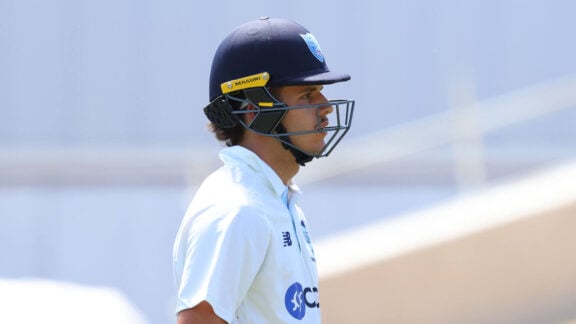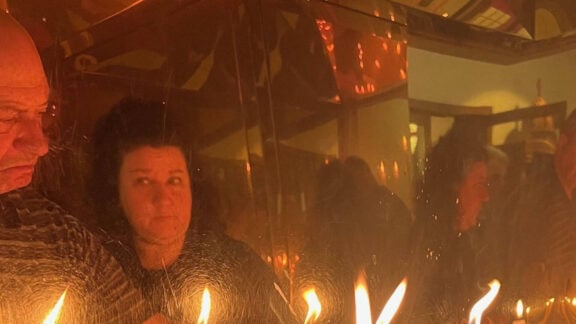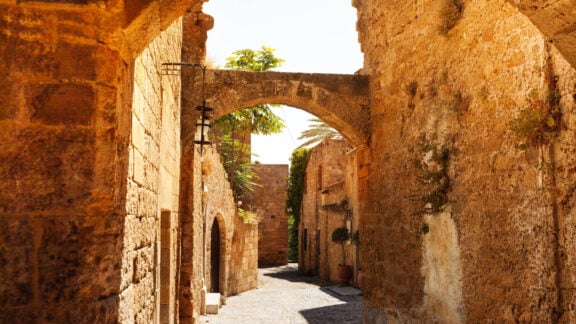I have known the Leader of the Victorian Opposition, John Pesutto since the days of the Baillieu government from 2010-2013, where we worked together as advisers to the former Liberal Premier.
He is a life-time Liberal. Me, an ex-lefty, an imposter, opportunist, Machiavellian, or traitor, depending on who you talk to. Both of us are products of one of the greatest waves of migration in the modern world, post-war migrants from Southern Europe.
Our parents, like hundreds of thousands of others, were forced to leave the ashes of war-torn impoverished south to work in the factories of Australia. Pesutto jokes that he’s “from the Greek parts of Italy”, and is married to Betty, a Greek Australian, with whom he has two daughters. The lawyer, a premier’s solicitor, and former shadow attorney general, exhibits unfathomable patience, and tenacity.
Traversing defeats defines his survival
Pesutto is no stranger to the eviscerating impact of failure.
“You’re sitting with somebody who’s been beaten down a few times, more than a few times, but you just gotta get up, dust yourself off and keep going.”
Once he graduated from law school at the University of Melbourne in 1994, Pesutto ran for the seat of McMillan, and lost. He lost four times before winning on the fifth go.
Ted Baillieu, for whom Pesutto acted as a government solicitor, was the last Liberal to win government in Victoria. Ten weeks after Baillieu was politically assassinated by his own in 2014, Pesutto was in parliament only to lose his seat four years later on live television when Labor decimated the Liberals led by Matthew Guy.
Pesutto has been leading the Liberal party since 2023, and as of last Wednesday, in an The Age poll, he edged ahead of Jacinta Allan, for the first time as preferred premier.

Migrant legacy and aspiration
Pesutto was raised in Traralgon, in Gippsland. It was a working-class migrant household where they “didn’t really have connection in business, or politics” but he was passionate about politics.
“I was drawn to the Liberal Party because my parents had, like, many migrants come here with nothing but the sense of aspiration and through hard work and individual endeavour made a life.”
One-word Pesutto uses when talking about migrants and multiculturalism is “aspiration”.
“Australia provided the freedom to pursue mobility, whether you want to build a business or choose another path—you have the choice and security here.
“Unlike places where corruption and poverty prevailed, where it was every person for themselves, in Australia, the justice system protects you and provides support regardless of whether you speak English or not,” says the lawyer.
As a modern democracy, Australia, Pesutto says, wasn’t “founded in the the crucible of revolutionary war, like the United States was which has a marching momentum to it.”
“We were a country that was founded in a peculiar way, but we’re no less a great idea. And when you think about? What Australia has achieved In in its modern iteration? We’ve gone through at least three major chapters: First Nations’ 35,000 year history and culture, British settlement, European migration, and then broader migration from around the world.
“Think about what we’ve achieved. Today, every part of the globe is represented in modern Australia in the most harmonious way.
“I’ve never argued we’ve achieved perfection but I would argue that no one does it better in terms of economic opportunity, and what I’d call general egalitarianism
He points to Australia’s “strong safety net” and the public health and education system.
“If you don’t have money you can still get into a hospital for free. Certainly, there aren’t as many bulk-billing doctors, but you can still go to a GP for free.
“You can attend a good government school, others will argue schools can be better supported, but there are services all around us. We are an idea in practice that exceeds most other countries.”
A set of philosophies” drew him to the Liberals “rather than a positions, says Pesutto who says he doesn’t buy into “the old shibboleths or expected pathways”.
“My parents were manual labourers – a sparky on the power stations and a machinist in a shoe factory”.
Not scared to fight for higher values, regardless of damage
Pesutto recently came out of a three-week defamation trial brought against him by Moira Deeming, the former Liberal MP ousted for her association with a rally infiltrated by neo-Nazis. Deeming claims ignorance of the neo-Nazis’ presence, regardless, Pesutto moved swiftly to expel her, citing her associates’ alleged extremist ties. In turn, Deeming accuses him of defaming her. While the judge has yet to hand down a decision, it was a difficult and damaging process.
Soon after the trial ended, Pesutto staved off an attempt to round numbers against him in the party room. He says he feels secure he will lead the Liberals to the next state election in 2026.
“I am very alive to how answerable I am to my colleagues, and the risk that comes from hubris, you have to earn it every day.”
“John Howard had this gratitude for the trust colleagues had given him to lead, that’s always stuck with me.”
Pesutto won’t be drawn into criticising the right of his party.
“We have challenges like any party, the Labor Party has factions he adds, “it’s not because of ideologies”.
“Put any political group of people in a room at the start of the day, by the end of the day, you’ll have the socially conservative drifting into one group, the economically conservative in another, and the progressive in another.
“There’s an equanimity that must come with that, to recognise that this is the nature of major political parties.

Vision beyond Melbourne – open up the corridors
Pesutto mounts scathing critiques of Labor’s housing policies, the state debt, budget blow-out on infrastructure projects and what he says is “a politicisation of the bureaucracy.”
Recently Allan announced housing clusters around train stations in the inner city which he calls, “a short compass by which premier Allan wants to focus all of Victoria’s growth still around Melbourne.”
His is a “whole-of-state vision” and says Melbourne’s growth corridors “must accommodate more growth.”
“We shouldn’t tie the capital expenditure program solely to suburban rail.”
“The rail project commits debt to one area, ignoring development needs beyond Melbourne.”
Pesutto wants capital expenditure programmes to be planned in a way that isn’t, “around the suburban railway.”
“The suburban rail is committing generations worth of funding in the form of debt to one project that no one called for, when you have pressing needs to develop the state outside of Melbourne.
“As the shadow spokesperson for multicultural affairs, I attend many citizenship ceremonies in Melbourne’s growth corridors — the Southeast, North, and West. These areas are projected to grow four times faster than the inner and middle rings of the city.”
“These suburbs will grow by about 450,000 people by 2036, “that’s huge numbers”.
“People say, that’s urban sprawl, that may well be a theoretical position, but you’ve got to look at what’s happening on the ground,” he says.
“The Allan government nickel and diming infrastructure, and any stock that is built is going to be well beyond the affordability.”
The state debt and taxes
Victoria’s mounting debt is his other target. Pesutto doesn’t accept the argument that debt is all due to governments Keynesian spend during COVID-19 Pandemic.
“Victoria’s COVID debt is a small part of the overall debt at around $30 billion of the $180 plus billion that we owe”.
“We pay $17.8 million daily interest for that debt which bleeds funds away from schools and healthcare.
Higher taxes, sold as COVID payback is another target .
“All reasonable people are willing to pay tax for services” but these higher state taxes are “forcing many businesses to leave or consider leaving the state.
“High payroll, and land taxes mean fewer jobs, fewer homes to rent, and higher rents.”
Pesutto calls the land tax threshold reduction by Allan government from $300,000 to $50,000 “churlish.”
“Who are the Allan government trying to hoover up now, a nurse, or a tradie who’s trying to create some security, and might own a small plot of land that might be worth 100,000?'”
“Most people who own a second property are on incomes of $100,000, they’re not Ferrari driving property moguls.
“For the many Greeks at Oakleigh Glendi, that I talked to, land tax is a big issue. ”
Given the housing crisis, hiked land tax Pesutto adds has made “construction costs unmanageable”.
Inner and middle-ring suburbs, apartment developments are becoming unviable, “as achieving necessary yields would require unit prices around $14,000 per square metre.”
“This puts two- or three-bedroom units—which are key to attracting young families—well above $1 million, out of reach for many first-time buyers.
Bringing down the debt is his key focus if elected as premier, by “regaining control of major projects.”
Blowouts now exceeds over $40 billion, “closer to $50 billion” Pesutto says, and points to “more recent blowouts announced for the Metro project.”
“We’ve got to stem the bleeding on these projects; it’s sucking the life out of everything. The Allan government hasn’t been upfront about when full suburban rail costs will hit the budget.
“The West Gate Tunnel was a market-led proposal after East West Link was cancelled. The government simply accepted Transurban’s suggestion.
“We’ve seen blowouts, disputes, contamination—the suburban rail loop is contentious due to its size and lack of due diligence.
He blames the blow-outs on the concentration of power around the “politicisation of the public service, and the centralisation of power in the Premier’s office.
“The Premier’s office has expanded enormously,” Pesutto says and adds that role of the Department of Premier and Cabinet and Department of Treasury and Finance as central agencies is “to give frank and fearless advice, in particular those departments.”
“Commonwealth Games is an example where an idea was germinated in the Premier’s Office, and one or two other ministers. They ran with it.
“These departments felt they had to prove-up the case rather than provide the government with honest advice.
“A proper Westminster culture of frank and fearless advice doesn’t mean that governments can’t do what they want to do, fearless and frank advice, can allow government to make decision knowing all possible repercussions.”
Interculturalism, fuelled by aspiration, and seeking unity
Multiculturalism runs through “every area of decision making” and for Pesutto, it is about the “changing face of Victoria, and Australia.
“Victoria has been certainly the last year, been the fastest growing state in in the country.”
Pesutto asks every candidate at citizenship ceremonies about their story.
“Everybody’s has a struggle of some kind, there’s a movie in everybody’s life, particularly when they’ve made that arduous migrant journe and it is real for me as an individual, I’m part of the story.”
He sees a pivot of multiculturalism into “interculturalism.”
Antipodes on Lonsdale Street, is “a huge festival, where tens of thousands of people come from all over Victoria, from interstate and even overseas”.
“It brings people from everywhere together. The same with Diwali, Ramadan, Hanukkah, all these other events are now Australian celebrations.
For me multiculturalism is also about taking part of each other’s events, festivals, and rituals.
On the recent fraying of social cohesion, particularly over the war between Israel, Hamas, and Hezbollah, he leans into his roots. “E Pluribus Unum. ‘Of many come one’.”
“Despite historical differences which may evoke real grievance and passion – we all must be prepared to be a part of that mediation of difference.
The migrants’ son finds the view by some of multicultural communities by some advocates, “as permanently disadvantaged, insulting”.
“Disadvantage historical, and in the present is real, but people are aspirational.
“People want to know that if they want to work hard, they won’t be held back because of their race, faith, or culture.”
He sees continuing Indigenous disadvantage, and “our nation’s treatment” of First Nations people as “shameful”.

However, Pesutto voted no in the referendum for a First Nations Voice in Parliament. He says he understands the “importance of positioning, I get all of that” but doesn’t do “paint by numbers of politics”.
I spent much time on calls trying to sway him to vote Yes, Pesutto listened and tormented over the issue.
“I can be frustrating, it was for you, and many of my supporters –you know how I agonised over the Voice,” Pesutto says.
“I wanted to support the Voice and was searching for way to do so, and it took me months to finally make my decision and I wanted to give it full and detailed consideration.”
Pesutto is hesitant over calls for a modern-day treaty, “I understand it historically, but in a diverse country like ours—where people have come to escape wars, injustices, and persecution—who would we make a treaty with?”
He fully endorses recognition of First Nations people in the constitution but “there were no changes by the federal government to the language which might have brought people like me on board.”
The culture wars, of which he has been caught in from left and right frustrate him.
Disadvantage isn’t only cultural, or racial he says—”it can affect a young child who has grown up in a household with ten generations of poverty, or one where they’ve witnessed or suffered sexual and physical abuse or dealt with drug and alcohol issues.”
He adds disability, “especially when families fail to provide care or when services fall short.”
“While disadvantage rooted in historical cultural legacies cannot and should not be denied, it’s important to recognise that it’s not the only form of disadvantage.”
Can the liberals win the next election? The number of seats need are great, and he is concerned about the diminished number of Liberal seats, in Victoria – at a federal and state level.
“I think we have seven federal MP’s who are Liberals in Victoria out of the 37 seats in Victoria.”
When John Howard became Prime Minister, there were around 20 Liberal Party seats, he adds. “We hold no seats in the Western metropolitan region, none in the Northern Metropolitan region, and two seats in South-eastern region of Melbourne, and some seats in the regions.
Pesutto wants significant campaigns in these seats to connect to migrants, the working class, shopkeepers, small business people because as he repeats, “aspiration” he says “is at the core of migration.”
“I’m going out to Werribee, Brimbank, Tarneit and Hume repeatedly, and what I get from those multicultural communities, overwhelmingly, is an ethos of aspiration.
Language teaching at state and tertiary levels, in after-hour schools he says hold “immense importance”, not only for their cultural significance but for “their educational and economic value.”
“While we haven’t announced it yet, we remain committed to funding Greek and other language programs in every election.
He is also cognizant of the value of independent multicultural media, and says he’s committed to the government’s revised advertising budget allocations which went from 7.5 per cent to 15 per cent under Dan Andrews.
Pesutto’s understanding of history, politics, and law—from Ancient Greece and Rome, to the Westminster system and the “revolutionary experiment of George Washington’s America”—will be a valuable resource as he pursues unity, builds his team, and strengthens his party sufficiently to challenge a Labor government entrenched in power for over a decade.
Regardless of whether the son of migrants endures, or wins, Pesutto has experienced a few Lazarus-like revivals and shows no sign of losing his appetite for the good fight.








